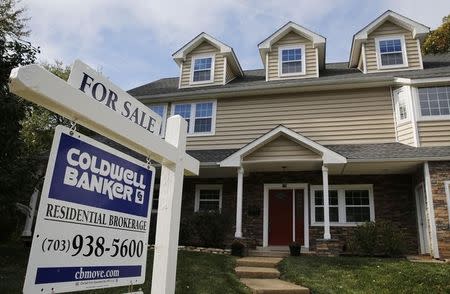First-time buyers lift U.S. home sales to 5-1/2-year high

By Lucia Mutikani WASHINGTON (Reuters) - U.S. home resales surged to a 5-1/2-year high in May as first-time buyers stepped into the market, the latest indication that housing and overall economic activity were gathering steam in the second quarter. The strengthening economic outlook likely keeps the Federal Reserve on course to raise interest rates later this year. The National Association of Realtors said on Monday existing home sales increased 5.1 percent to an annual rate of 5.35 million units, the highest level since November 2009. That put sales this year on track for their strongest gain since 2007. "It suggests that the U.S. housing market recovery is back on track after the missteps earlier this year. We expect this upbeat tone in the housing recovery to continue as the favourable domestic fundamentals begin to reassert themselves," said Millan Mulraine, deputy chief economist at TD Securities in New York. Tightening labour market conditions are starting to spur stronger wage growth, boosting demand for housing. Last month's increase reversed April's surprise drop in purchases, which economists had dismissed as a blip given that forward-looking indicators on home sales, including mortgage applications, had been fairly strong during that period. The Realtors group revised April's sales pace up to 5.09 million units from the previously reported 5.04 million units. Economists had forecast home resales rising to a 5.26 million-unit pace last month. First-time buyers accounted for 32 percent of transactions, the largest share since September 2012. Still, the share remains well below the 40 percent to 45 percent that economists and realtors say is required for a robust housing market. May's sturdy home sales report added to last week's data on building permits in portraying an upbeat picture of the housing market. It joined strong retail sales, consumer sentiment and employment data in suggesting a building up of momentum in the economy after output contracted at the start of the year. U.S. stocks were trading higher on the housing data. Market sentiment was also buoyed by hopes of a deal to avert a debt default by Greece. The housing index <.HGX> was up 0.63 percent, with shares in D.R. Horton the largest U.S. homebuilder, rising 1.5 percent. The dollar rose slightly against a basket of currencies, while prices for longer-dated U.S. Treasury debt fell sharply. EASING CREDIT CONDITIONS The share of first-time buyers was up from 27 percent a year ago and the latest increase reflects moves by the government to ease lending conditions for this demographic through Fannie Mae and Freddie Mac, the mortgage finance companies it controls. "These programs should boost sales activity through the summer," said Stephanie Karol, an economist at IHS Global Insight in Lexington, Massachusetts. Away from first-time buyers, young adults setting up homes are also giving housing a steady pulse after a lacklustre performance over the last few years. Economists hope that housing will take up some of the slack from manufacturing, which is being stymied by the lingering effects of a strong dollar and spending cuts in the energy sector, and support the economy this year. While the stock of homes for sales is improving, supply remains fairly tight. This means builders such as D.R. Horton and Lennar Corp will need to ramp up construction to meet demand. Last month, unsold homes on the market increased 3.2 percent from April to 2.29 million units. Supply was up only 1.8 percent from a year ago. At May's sales pace, it would take 5.1 months to clear houses from the market, down from 5.2 months in April. A six-months supply is viewed as a healthy balance between supply and demand. With supply well below what it was during the housing bubble in 2006, the median price for a previously owned home increased 7.9 percent from a year ago to $228,700. House prices this year could exceed the peak set in 2006, the Realtors group said. "Households not in the market will be priced out soon unless price appreciation slows to a rate that would allow more buyers to enter the market," said Alan MacEachin, an economist at Navy Federal Credit Union in Vienna, Virginia. On the flip side, rising house prices are increasing equity for homeowners, encouraging some to list their houses. Realtors and economists say insufficient equity has been forcing potential sellers to stay longer in their homes. (Reporting by Lucia Mutikani; Editing by Andrea Ricci)

 Yahoo News
Yahoo News 